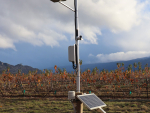Bay of Plenty Regional Council staff are encouraging open dialogue between kiwifruit growers and their neighbours as the kiwifruit spray season starts this month.
Bay of Plenty Regional Council senior pollution prevention officer John Morris says that growers are usually compliant with spray rules but in some areas, a little extra care is appropriate.
"The Bay of Plenty Regional Air Plan requires orchard owners or contractors to notify the neighbours of any adjoining properties within 50 metres at least 12 hours before spraying and no more than 20 days in advance.
"This year we've also encouraged growers and industry representatives to develop extra guidelines for spray timing and notification near schools and other sensitive public areas at Te Puna, in response to concerns raised by the local community there," Morris says.
Hydrogen cyanamide, often known by the brand name Hi Cane, is sprayed by growers onto their kiwifruit vines at this time of year to increase the number of fruit on the vines, promote bud break and encourage earlier and shorter flowering.
"Generally neighbours like to be notified about Hi Cane spraying so they can take extra precautions such as moving stock, keeping pets inside, or going elsewhere while the spray is being applied. Road users, including pedestrians and cyclists, also have a right to be warned; especially when spray is being applied to orchards that adjoin public roads near schools, bus stops or sports fields and at times of high pedestrian flow," Morris says.
The Regional Air Plan requires spray warning signs to be displayed on the road boundary of any affected orchard at least 24 hours before sprays are applied. Signs are to be removed by the applicator when the spray area is safe for re-entry.
"Kiwifruit growers are part of the community. If everyone works together to look out for each other we can keep building on the great work that's been done over the past few years to improve spray management. Unsafe or un-notified spraying should be reported to the Regional Council's Pollution Hotline on 0800 884 883. The hotline is staffed 24 hours a day, seven days a week," Morris says.



















